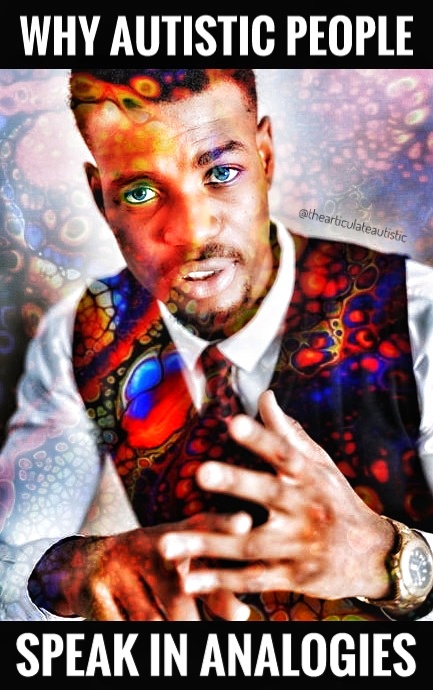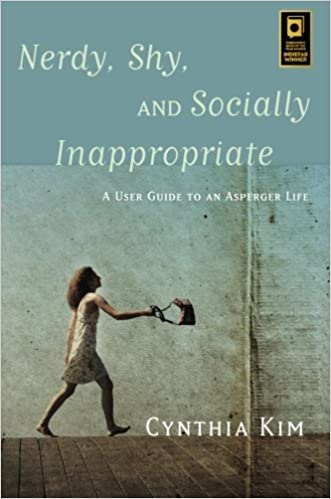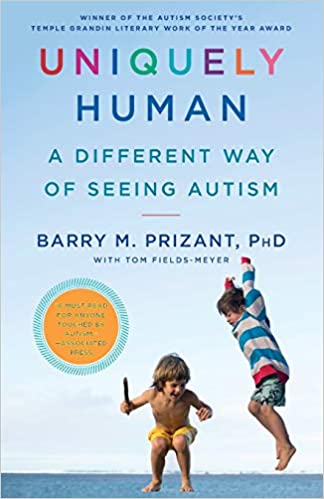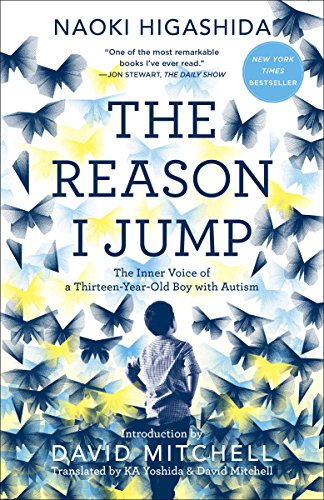Why Many Autistic and Otherwise Neurodivergent People Explain Things in Analogies

Very rarely can I explain anything without using an analogy. It’s the way I speak and communicate, and it’s as natural to me as breathing. I literally know no other way to communicate what I perceive as complicated or multi-layered information (which is most things, if I’m honest). It’s how I understand the world and how I help others understand it. In fact, it’s what I do almost every single time I write a blog.
However, my analogies, like many neurodivergent ways of communicating information, have often been misconstrued. See, I say what I mean, and I mean what I say. Words have literal weight and meaning to me. Unfortunately, this is not how the majority of the neurotypical world communicates. There are nuances and tones and subtleties that are still lost on me and probably always will be.
Analogies are my bridge. I don’t know when I discovered how to use them, but I bet it was at some point in my confusing and frustrating childhood where I was just like, “When I hear this noise, it’s like someone took an ice pick and shoved it into my ear” or something of the sort. I just remember a look of dawning comprehension appear on someone’s face once, and it was the first time I was ever understood, so I’ve been using analogies ever since.
Usually, they work well. But, as I said, sometimes they are misconstrued.
Here are the most common misunderstandings around my use of analogies:
- Insensitive
My analogies have been seen as insensitive because I have used one group of people to help others understand another group of people. For example, I’ve said on multiple occasions, “Not understanding jokes or sarcasm is just like being in a wheelchair without the use of one’s legs. Nobody would ever get upset with the wheelchair user for not getting up and walking up a flight of stairs, but it’s perfectly socially acceptable to get upset with someone who doesn’t understand jokes or sarcasm and expect them to change.”
My point is, one disability (or difference) is visible, the other is not, but both are 100% valid and should be treated as such.
Unfortunately, some have seen this analogy as insensitive. I don’t understand why, and I don’t think I ever will. People have tried to explain to me why this would be insensitive, but I don’t understand, and I’ll never stop making comparisons like this unless someone can explain it in a way I can understand.
Also, it’s usually not wheelchair users (or blind or deaf people) who get upset about this, and it’s pretty rare that anyone does, so I will continue because it’s so helpful and useful for getting people to understand that I feel the “social risk” is worth it.
- Unrelated
I’ve also had people get hung up on my analogies so much so that the point is missed entirely, and it feels like the person is gaslighting me. Gaslighting, if you’re unfamiliar, is a psychological method of torture whereby you get people to doubt their own thoughts, feelings, and memories. One way this is accomplished is by purposefully “missing the point” of a statement and zeroing in on the way someone has phrased something, their tone, or their misuse of a single word.
I used to make an analogy to an ex of mine that mentioned Stephen King. I have no idea what the analogy was at this point, but I think it was about needing time to be alone and write and trying to use him as an analogy, and my ex would be like, “Oh, you’re comparing yourself to Stephen King now?”
No, of course, that’s not what I was doing, but them acting as though what I was saying was unrelated to my point got me completely off track and explaining what I meant, which got me confused and them off the hook.
My analogies may sound unrelated or like I’m trying to bring up another topic at random, but that’s never the case. I’m trying to communicate to be heard and understood. There’s no hidden agenda in it.
- Talking Down
Every once in a while, and this happened a lot more when I was younger, people will think that my using an analogy is an attempt to talk down to them. Since people often use analogies and stories to help children understand things, they mistakenly believe I’m trying to talk to them “like they’re stupid”. Not at all. Again, this is just how I communicate, clarify, and connect. No hidden agenda.
- Shifting Focus
This one really baffles me, but I’ve also been told that when I use analogies from my own life when someone tells me something they’ve been through that I’m shifting the focus to myself. Not at all. Again, I’m just attempting to communicate, clarify, and connect. It isn’t about me, it’s about making sure both of us are on the same page. If we’re not, then I can’t understand you. If I can’t understand you, I can’t really connect with you. If I can’t connect with you or your story, I can’t empathize with you, and that’s what I’m trying to do and what I think you would want when sharing something about your life.
(Article continues below.)
The best way to improve communication with your autistic loved one is to understand how your autistic loved one’s mind works! Intentions, motivations, and personal expressions (facial expressions or lack thereof, body language, etc.), are often quite different in autistic people than they are in neurotypical people.
Experience a better understanding of your autistic loved one by reading books about life from an autistic perspective as well as stories that feature autistic characters. You’ll have so many “Ah ha!” moments and start seeing your autistic loved one in a different light (and you’ll have a better understanding of their behaviors, which you may have been misinterpreting up until now).
Books I recommend for a better understanding of your autistic loved one:
The Takeaway
I use analogies to communicate, clarify, and connect.
Very likely, the autistic or otherwise neurodivergent person in your life is doing the exact same thing when they use analogies, but the intention of those analogies may be misinterpreted and therefore dismissed or discouraged.
If my ability to use analogies were taken away from me tomorrow, I would lose 80 percent of my ability to communicate with neurotypical people. It would have just literal language, and that’s it, and that, to me, is terrifying. You might as well cut out my tongue and cut off my hands. I would be hobbled.
And that analogy, as graphic as it is, is the only way I can communicate the horror of what that would feel like for me.
If your ND loved one is using analogies, don’t stifle it, encourage it, and USE THEM BACK. For many of us, analogies not only help us to communicate better, they help us to understand better.
Join our private Patreon, members-only Facebook group by clicking here! Only $1 per month.










YES! THANK YOU! *excited hand flapping* This is so important because analogies are one of my only ways of explaining.
About the wheelchair analogy:
People see being visibly disabled as a huge thing and see neurodivergent traits as fake or something you should “work harder to overcome.” So when you compare the two by saying that you, an autistic, have a similar problem to a visibly disabled person, some people will think you are exaggerating your problem in order to get their sympathy and escape the criticism or awkward social situation you were facing for not understanding sarcasm. It looks to them like comparing yourself to “poor, tragic wheelchair users” is crocodile tears and something you are doing for selfish personal gain.
They then are upset that you are “using the struggles of wheelchair users for selfish personal gain” and feel like you are disrespecting them.
Yay! I’m so glad it resonated with you!
Excellent explanation. I have fallen foul of this kind of analogy too and was so upset by the reaction I could not continue the very important (to me) conversation. Feels stupid to say but years on I still believe my analogy was exactly right… but the reaction make me try to communicate without analogies only to get told I don’t make sense… left me lost for words.
Wow. You understand me! I have the same reactions from people when I use analogies. It’s a baseline for understanding the topic. If someone says, “No, it’s not exactly like that,” then I have enough of a ground work for understanding and can work the differences into my baseline. I have noticed that analogies to events in movies are more universally understood and accepted. So, I try to stick with those.
For the record, I don’t understand why your wheelchair analogy is considered insensitive. 🤔
Thank you for sharing this!
I DO understand you. lol! It’s wonderful when us neurodivergents can validate each other’s experiences, isn’t it?
Thank you! This is exactly how I feel! I’ve been accused of talking down to people so often when I use analogies, but that isn’t what I’m doing at all. I just want to make sure we both understand the same thing. Thank you for writing this!
Absolutely! I understand completely. That’s what I’m trying to do, as well.
I’ve been told my use of analogies is aligned with White supremacy culture because the analogies I use are culturally specific. Which they are because I have exposure to a limited number of cultures at a level deep enough to draw from for the purpose of analogies. Unfortunately, analogies are the only way I seem to be able to communicate with NTs that they understand and respect. I’m so effing tired…
I love your blog. I just found it this morning and am trying to enthusiastically read everything. However I am running into an accessibility issue? Whenever I try to open links in new tabs, or when I try to highlight text to keep my eyes’ place on a long page, the site pops up a red warning and prevents me. I do not understand it says something about content protection. Is there an accessiblity tool for allowing me to read comfortably without right clicking? I depend on this on desktop reading.
OMG. I feel SEEEEEEEN
I don’t know whether I’m ND or not, but when I read things like this, I suspect that I might be. And not knowing is just fine with me.
I’ve always been shy, reserved, quiet and everything that goes with that, the geek, the computer nerd, not having a girlfriend for ages. Lol.
Now I’m happily married with two wonderful daughters… and I manage people, of all things, and I’m really enjoying it. Something I never would have thought possible 10 years ago. Sure, I’ve been a team lead on more than a few occasions and done it well but that’s more technical than people management.
Why do I tell you all this? Because, for me, the key to real communication is in listening, really listening, to a person before responding (and sometimes not responding if that’s appropriate), and then framing my response in a way that I believe they would most understand. It takes a lot of effort, but it’s worth it.
And for written communication, reading my responses 2,3,4 times and correcting before pushing send.
Thanks for your comment. It sounds like you do a LOT of masking, but I fully understand. When I was in the corporate world, I did the same thing. It’s the only way to survive until neurodivergence is better understood.
I completely identify with this article!
NT people always seem to think I’m “going too far” or “over-explaining” when I use analogies. I usually use them if I think they need something explained in a different way…I’m trying to help them! But now I think it’s that I’m misreading their facial expression. I always thought people weren’t responding to my explanation, so I would use an analogy. Then they would look uncomfortable and interrupt me to say, “Yeah, okay, I get it. I’m not stupid.” Or something to that effect. Then I would be confused and hurt….
Now I wish someone, an NT person, would have taken the time to explain that to me. Instead of my learning it much later, having suppressed my natural instinct for so long I now hardly ever use analogies.
Trying to communicate and explain something without being allowed to use analogies, to me, is like wanting to scream when you don’t have a mouth. Yes, just like Hello Kitty.
Yes, this! Perfect (ironically) analogy! 🙂 😉
Your article was an eye opener. Thank you for taking the time to explain why you do things the way you do. it will help me try to be better understanding of people doing this in the future.
I am one of those people who have a short attention span, and often get side tracked waiting for the person to finish their explanation. Short answers are the best for me to hear, and it is very frustrating to hear a long answer when, to me with my attention span, a short answer would suffice.
Again, thank you for your insights. I have never considered this before and you’ve given me some new insights!
I’m so glad it resonated and explained some things for you. 🙂
Over the last year or two I’ve been reading articles written by autistics-explaining how they communicate. I’ve always figured I was just “weird” for the things I say or how I explain myself. I wonder why too many voices speaking at me physically hurts my brain.I don’t like hugging or anyone too close to my face or near my ears. Why having my bare legs or feet touched feels like someone releasing centipedes into my nerves. I have never said most of these things out loud bc I fear seeing the confusion. I feel like maybe it makes sense here. I hope. For 43 years I’ve been training myself to make eye contact and not to fidget or move around when I speak to people. I never feel understood. Reading this is one of the few times I’ve felt like someone else gets it. I’ve never been diagnosed but my parents never would have done that. I’ve always figured it was linked to my anxiety/depression/claustrophobia-a million other things….I’ve tried to have a serious conversation w family but they treated me like I was being dramatic. I just want to be understood. Anyway, just wanted to leave this here. It just feels nice to know I could make sense to someone else. Thanks for sharing.
Diagnosis could be a relief for you!!
Celia
Wow. I never realized that the two were connected. Thank you for this.
I tell people that just because my scars are on the inside and not visible, it doesn’t mean they aren’t there. If someone breaks a leg, they’re in plaster for months, but then they walk unaided again. Being me is a struggle I’ve had all my life that is not going to get better by giving me crutches for my head.
I had no idea that this was an autistic trait but I do it all the time!!!
I use analogies all the time because I find it easier to explain myself by setting a scenario but many people take that as literal and it ends up going completely past them. It’s even started rows because they think I’m trying to make a personal point. Why do some people think everythings about them? 🤷
Hi Jaime, when you write, you clearly communicate effectively. Is there a difference when you write vs verbally?
There’s a night-and-day difference, yes.
Thanks for a helpful article. I am neurotypical, but close to someone with asd. The other side of this coin is that the nt listener often simply gets lost in what might be an extended analogy. I don’t know what the answer is here, to try and build bridges, but useful to have an explanation.
This has been really helpful. I taught high school for nearly forty years, and always used analogy to explain concepts. A classic example concerns the importance of energy in creating the landscape. Instead of just describing rivers, glaciers and so on, separately, with their complex vocabularies, I would begin by talking about something needing food/fuel to start, maintaining momentum, then running out of energy. It worked. But I was once pulled up by a parent listening in on a private tutorial: ” “What are you asking about? I asked you you teach them geography!”. I thought everyone did it, but have been identified as neurodivergent since I retired.
So I was recently excluded from our church as people felt it difficult to communicate with me, felt like they were walking on eggshells because they couldn’t predict how I might react. They got annoyed as I also say it how it is, I said it wasn’t Christian behaviour or indeed acceptable behaviour to shut people out just because they are ignorant of ASD. I left the church as I think better of myself. I incidentally have a Masters in English and drama!
I often use analogies, either because it helps interpret something through how I see the world or to challenge ignorance and discrimination.
I’m also a parent of Autistic children and last week my youngest child was given a detention after going into Autistic shutdown. The school made drastic changes to her timetable, changed teachers and subjects but provided no support to transition. As a result, she shut down completely and was given a detention because the teacher had “asked calmly” for her to do her work.
Similar to your analogy, I told the school that they wouldn’t be giving out detentions to a child having an epileptic seizure. When they tried challenging back on “asking calmly” because it’s on the adjustments, I asked them how foolish they would look if they tried handing a sensory object to the same child during a seizure. Because it’s there, doesn’t mean that is the right approach for the situation, ignorance is not an excuse.
I tend to find that I start off on a good footing with analogies but if it’s something that annoys or frustrates be due to lack of ignorance, I don’t tend to hold back on sensitivities. The latest one yesterday (same school) I told them they are the Police Officer in Ghost Boys, to own it and sort it.
You describe my own experience perfectly, I feel so seen reading your article. Analogies are a major tool in my toolbox, without them all I’d have is a hammer and that is no good when I need to screw in a screw 🙂
As for the wheelchair analogy, personally I’m totally fine with it. But I think some people find it upsetting because of a difference in magnitude. Not being able to walk is majorly debilitating and closes off a lot of activities to you, whereas not being able to understand sarcasm is seen by NT people as more of a minor inconvenience. Maybe if instead of a wheelchair user it was about a person who needs to wear glasses to read street signs, it would make more sense to them.
Thanks for your comment, Natalie. Yes, I’ve been using the glasses analogy a lot more now. 🙂
Your analogies are considered insensitive because they are taboo. You’re calling out a group of people with a disabilities that seriously affect their quality of life. It comes off callous and uncaring for you to do this. It’s much easier for others to empathize with someone that has no leg mobility because every day we rely on our legs to make it successfully through the day. This is not to negate the crippling effect poor social skills can have on your life. The breakdown in your analogy is multifaceted. Not only is physical disability more relatable than social.. but it sounds like you are diminishing the affects of being physically disabled. As if their daily struggle isn’t that big of a deal. People who can not connect the dots of your analogy are most likely people who have had social skills comes very naturally to them. Therefore they have probably never considered how ostracizing and agonizing life can be with below average capabilities of understanding social skills. Many people, if given the choice would probably opt for a social disadvantage over Living with a physical disability. The physical disability also causes social distress such as figuring out if your wheelchair can fit in certain places, or a troubled dating life etc. The analogies are taken wrong because you are thinking of it logically and they are being processed by others emotionally.
Ah, well. I think you just perfectly proved my point that social disabilities *are* just as disabling as physical ones. However, I do appreciate you taking the time to explain. To avoid offending others, I’ve started using the “glasses” analogy, which seems to go over much better. I can’t see without glasses or contact lenses, and I also have difficulties communicating socially with non-autistic people, so since glasses are much more mainstream and accepted and integrated into our society (and have less taboo), I use that to explain autistic difficulties and need for accommodations. Again, thank you for explaining. I do appreciate it because until this very moment, I really didn’t understand no matter how many times or ways people tried to explain it. You’ve got a knack. 🙂
I use the same analogy about someone in a wheelchair but to point out limitations when it comes to ‘fairness.’ You can’t expect a person in that position to play centre forward in a football team as they don’t have the capability to interact with more physically able players, anymore than we can be expected to interact with a society we don’t gel with either. As for language look up my Logic Lists English series on Amazon or ‘mind your language’ blog on Quora.com. The other blog there is trying to make sense of neurotypical behaviour.
I don’t know but I wonder if you used the analogy of a wheelchair differently and said : “If i had no legs..” or “If I couldn’t use my legs,” people might accept it better. Or maybe “if i broke my leg and was on crutches,” might go down better? Not because people’s reactions are justified but because you want them to understand without getting hung up on the analogy you are using. I think it is a great analogy and it is helpful for me to understand neurodivergent people. I’m trying to.
My favourite analogy is “If I were on crutches with a plaster cast on my leg, you’d accept straight away that I face challenges.”
And when I’m asked why I’m writing this crap to a complete bunch of strangers, it just reinforces my conviction that neurotypicals are equally incapable of getting it.
I ain to get to the point where I am able to communicate with our son….He is non verbal but communicates in a way I understand. Looking forward to hearing “mom” for the first time.
Wow, whilst reading so many of the above comments, felt like cool balm /snuggy blankey inside, towards the end…. Not so much. (referring to early Stephen King comment- missing actual point to nitpick about another detail) Again, thank you for the insight, those first commenters 😊